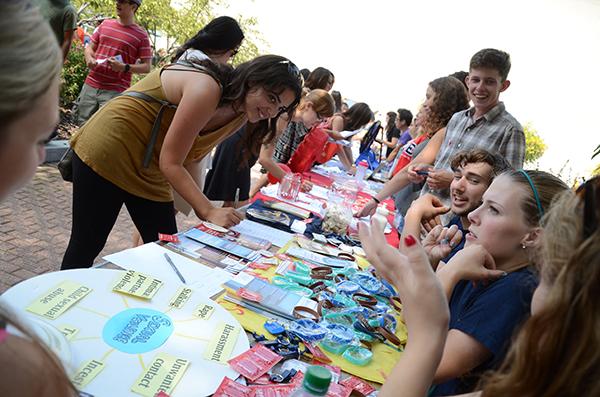The University’s only group of men focused on ending sexual violence disbanded this year after its founders graduated, revealing challenges to engaging male students in such advocacy circles.
The GW chapter of the national organization Men of Strength, which was established on campus three years ago, led training sessions and discussions about men’s roles in preventing assault. The group’s collapse stems from an issue that student leaders said they had faced for years on GW’s campus: It can be hard to involve men in conversations about sexual assault.
Kostas Skordalos, one of the founders who graduated last spring, said Men of Strength struggled to recruit and retain members from year to year.
“I think the organization did a great job in getting the word out, but we faced issues with getting people involved since there didn’t seem to be much interest outside of the people already involved in the group,” Skordalos said.
Co-founder Matt Scott, also an alumnus, said he doesn’t think progress around sexual assault education will slow down. Rather, he said it would be most effective if men joined the largely female group Students Against Sexual Assault. About four of SASA’s two dozen active members are men.
“I’d challenge GW guys to step up and actively address sexual assault,” Scott said. “We can’t be divided entities on the same issue.”
Kirsten Dimovitz, co-president of Students Against Sexual Assault, said the group is actively trying to recruit more men. She said SASA plans to increase outreach to Greek chapters, in the hopes that partnering with fraternities will bring more male students into a campus-wide dialogue.
Dimovitz said the group saw “great turnout” from male freshmen at Colonial Inauguration sessions this summer.
“Men are a huge part of the conversation but are just not engaged enough, which is why Men of Strength was so absolutely crucial,” Dimovitz said. “So often, opposing sides of the issue can paint the framework or the perspective that this is a women’s issue. This issue though isn’t something where we’re putting blame on men at all – it’s an issue where we as a community can work together.”
SASA usually sees a rush of new members at the start of the semester, she said, then male enrollment falls as the semester continues because they often struggle to find a place in the female-dominated organization.
“You have to find those guys who are really passionate, and you can’t just create them,” Dimovitz said. “If we have boys in our organization ready to start something like that, they can go crazy with it. But we can’t push them into the role.”
Many men feel like they can’t join conversations about sexual assault because of “a male-dominated culture which places men in a box,” said Clifton Trotter, a youth prevention specialist at the national advocacy group Peace Over Violence.
“At the core, we’re trying to shift culture, without gender divisions or pointing fingers. It has to be spoken from both sides because if you’re not telling everyone’s story, they can’t connect,” Trotter said.
Adrian Valdivia, manager of national programs at the sexual assault prevention group Men Can Stop Rape, said campus dialogues should also involve top-down instruction from administrators and student leaders. For example, Howard University hosted events likes Healthy Masculinity Town Halls and Campus Conversations last fall to discuss sexual assault and healthy relationships with large groups on campus.
At GW, sexual assault prevention training and bystander intervention workshops have targeted Greek chapters and athletes, but no specific programming exists for the male population as a whole.
Valdivia said schools with the most successful campaigns about men’s role in stopping assault focused on “having that conversation and integrating it into the everyday.”
“We need to address conversations like the kind that happen at a barber shop, where guys are joking around and someone says something about women,” Valdivia said. “Many men in the barbershop may feel like they should have said something, but most don’t want to upset the rest of the group, so they just laugh along. We gotta break that cycle and change those attitudes.”
Colleen Murphy contributed reporting.







